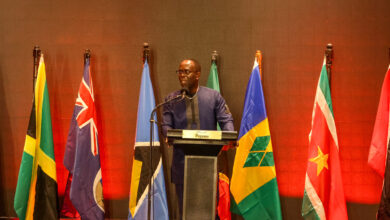CARICOM Youth Ambassadors (CYAs) and regional youth representatives who participated in the CARICOM-Pan American Health Organisation (PAHO) Climate Change and Health (CCH) Orientation and Training, are better equipped to lead climate change mitigation projects after completing specialized training on preparing effective project proposals and grants.
The capacity-building initiative was held at the CARICOM Secretariat in Georgetown, Guyana, from 23 to 26 April. The specialised sessions were facilitated by Mr. Christopher Chinapoo, an American Society for Quality (ASQ) Certified Quality Expert, who guided the participants through the stages of conceptualising, outlining, and developing proposals and grant applications using the Citizen Science approach. The youth leaders, working in country groups, identified local climate change and health issues and used the Citizen Science approach to develop viable solutions.


Melanie Lubin, Saint Lucia’s CYA, stated that using Citizen Science for her country’s project is critical for the high levels of engagement, relevancy, and impact she and fellow CYA, Joel Jean-Charles, want to achieve.
“Citizen Science is important because quantitative and qualitative data is needed to test certain hypotheses,” she explained. “[The approach] can be used to collect data through photos, questionnaires, and focus groups. Due to its efficient use of human resources, the approach also allows for lower rates of bias and higher cost-effectiveness.”
Melanie Lubin, Saint Lucia’s CYA
After learning about the approach, Jalen Monzac, St Kitts and Nevis’ CYA, explained that it is “faster and more efficient than the traditional way of conducting research”. He added that “rather than the researcher conducting the research themselves, the public can get involved. This leads to greater participation, and more areas will be covered, ultimately creating a diverse research project”.
The youth leaders in Mr Chinapoo’s session gained practical experience in writing project proposals. The session not only enhanced their knowledge but instilled a sense of confidence about writing future proposals and grants. Aurie Gordon, St Vincent and the Grenadines’ CYA, stated that the CCH training reinforced her ability to set goals and objectives, which will significantly improve her proposal writing. Joel Jean-Charles, Saint Lucia’s CYA, called the sessions “informative”, adding that he liked the hands-on training aspect. “We’ve been equipped with the know-how and tools to go back home and implement what we’ve learned,” he said. Iana Franks, St. Kitts and Nevis’ CYA, agreed, referring to the workshop as “insightful, helpful, practical, and straight to the point”. She continued, “I’ll be able to take my learning back to St Kitts and Nevis.”

Montserrat’s CYA, Nish Brown, also indicated that he would use project management and climate change information to help him develop projects in his home country. “I would love to implement some of the things I’ve learned in Montserrat. I’ve identified several projects I want to work on with my colleague, [environmental youth advocate] Darenthea Sweeney,” he said, adding that the ideas centre on the environment and finance.
This content is provided under the CARICOM Secretariat’s Climate Change and Health Programme (CCHP) in collaboration with the Pan American Health Organization (PAHO) with support from the European Union (EU).
The CCHP’s mission is to increase education on how climate change affects health and spread awareness on prevention and adaptation measures to reduce greenhouse gasses.






